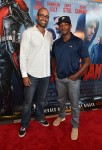When Nate Moore was a child, he was fascinated by Black Panther comic books. He said the superhero’s mysterious persona and technologically advanced home country provided an escape from his small hometown of Clovis, California.
The UCLA alumnus is a producer of the upcoming “Black Panther” stand-alone film, which is scheduled to premiere in February 2018 and is now working to introduce the King of Wakanda to a wider audience. The film will be the first in the Marvel Cinematic Universe to feature a black superhero in a leading role.
The Daily Bruin’s Daniel Maraccini talked with Moore about recent positive responses to the character, diversity in Hollywood and the pressures of working for Marvel Studios.
Daily Bruin: A recent article for The Undefeated called you the “man who put Marvel in the black” and credited you for introducing black superheroes like the Falcon and Black Panther. When you were hired at Marvel, was it your goal to make these films more diverse?
Nate Moore: Not specifically. When I was hired by Marvel, as a fan of comic books throughout my entire life, I was more excited about making cool movies about characters that I loved. I think it’s just that I happened to love characters like the Falcon who went hand in hand with Captain America, and that made me push for him. It was less about me having a specific agenda and more about me just loving the stories.
DB: Black Panther is the first black character to get his own stand-alone film in the Marvel Cinematic Universe. Does that add more pressure to you and the rest of the cast and crew to make a good movie?
NM: I think if anything we find more pressure over how well (Black Panther) is being received in (“Captain America: Civil War”). … Now we know the audience already seems to be there, so now we want to make a movie that satisfies an audience that really wants to fall in love with a new character. And I think that’s the pressure: making a film that delivers on the promise of the character as he’s presented in “Civil War.”
DB: It seems that in the past five to 10 years blockbuster films have started to feature more ethnically diverse and female-driven casts. Why do you think this is happening now?
NM: Hollywood is a very agnostic world when it comes to race and gender, but Hollywood is also a very bottom-line-driven world. … If you look at, for instance, “Bridesmaids,” that seemed to be a big deal because it was an all-female comedy cast, and after that you started to see a lot of movies that were similar. It’s purely only because someone decided to take a gamble, it worked and then everyone else wanted to capitalize on that gamble financially. I think Hollywood is just a place that likes to follow trends and right now, I think to everyone’s benefit, that trend is “Let’s be more inclusive and more reflective of our audiences.”
DB: Do you think this trend could turn into something more long-lasting?
NM: I think so. … We have to make sure that when we’re making these movies they’re good. Because as long as they’re good, they’ll be successful, and as long as they’re successful we’ll make more. And I think, as in all things, things are trends until they become the norm.
DB: Since you graduated from UCLA in 2000 do you think it has become easier for people who aren’t white males to be hired into leadership positions like producer or director?
NM: I think it’s becoming more common because more of us are finding our way into the business. Hollywood is a business where much of it is based on networking, frankly. Figuring out how to get your foot in the door is sometimes the biggest obstacle, but once you’re here, and you have a good work ethic, you’re smart and you have good taste and all those other things, I think there’s a ton of opportunities. I think now that more women and minorities are finding their ways into Hollywood, it’s only a matter of time before you start seeing more in leadership positions.
DB: What’s your favorite part of working at Marvel Studios?
NM: I really love the development process, in that when you’re sitting in a room with a director and a writer trying to figure out what the movie is. That’s when anything is possible. Because the film hasn’t really taken any shape yet, there are no bad ideas. It’s really fun to explore every idea possible because there are no wrong answers.
